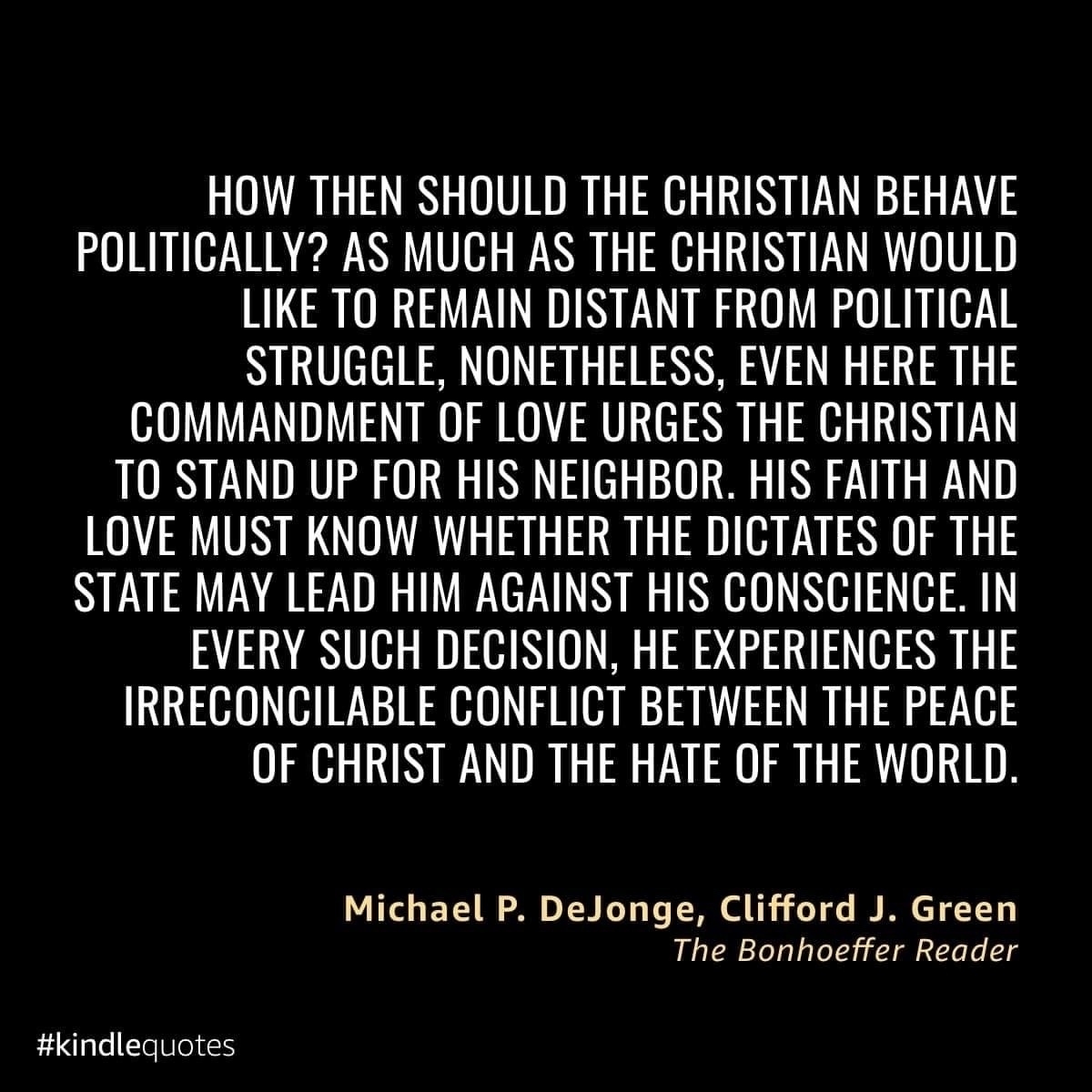Quotes and Notes
I am going to be writing through some things from this book, The Righteous Mind by Jonathan Haidt 📚.
I think Haidt has much to say to help us understand the moment we find ourselves in.
A century later, Christian teacher Origen challenged the Caesarean Christians of his time not to blur the powers. "For you who are redeemed by Christ... a physical sword has been removed from your hands... In its place the 'sword of the Spirit' has been given and you must seize it." For Origen, Christians are to fight the evil powers by means of *prayers and fasts, justice and piety, gentleness, chastity and all the virtues of self control."
Currently reading: Reckoning with Power by David E. Fitch 📚
“Failure is the mark of a life well lived. In turn, the only way to live without failure is to be of no use to anyone.”
Currently reading: Oathbringer by Brandon Sanderson 📚
I am excited to dive into this little book on power and the Church.
Currently reading: Reckoning with Power by David E. Fitch 📚
I just finished reading Jesus and the Powers by NT Wright and Michael Bird it was challenging and encouraging in all the right ways. I am going to do a little write up on it soon.
Finished reading: Jesus and the Powers by N. T. Wright 📚
Do you ever read a book so timely it is almost overwhelming? Something that grabs you by the soul and says, “LOOK!”
I am experiencing that right now with this little book.
Currently reading: The Tears of Things by Richard Rohr 📚
Currently reading: Jesus and the Powers by N. T. Wright 📚
“Perhaps the single greatest threat is not the rise of secularism or the emptying of churches, but the apathy and indifference of the churches that are still here.”
Currently reading: Jesus and the Powers by N. T. Wright 📚
Diving into some texts on power this week. Starting with this one and going from there.
I just bumped into this quote:
“When the Greeks got the gospel, they turned it into a philosophy;when the Romans got it, they turned it into a government;
when the Europeans got it, they turned it into a culture;
and when the Americans got it, they turned it into a business.” Richard Halverson
This was such a fun read. I am excited to continue exploring this world in Oathbringer. Finished reading: Words of Radiance by Brandon Sanderson 📚
During the 1933 Prussian Synod Dietrich Bonhoeffer offered multiple theses to challenge the “Aryan Paragraph.” The “German Christians” were those aligning with the Nazi party, “We,” was the nascent Confessing Church.
Currently reading: The Bonhoeffer Reader by Michael P. DeJonge 📚
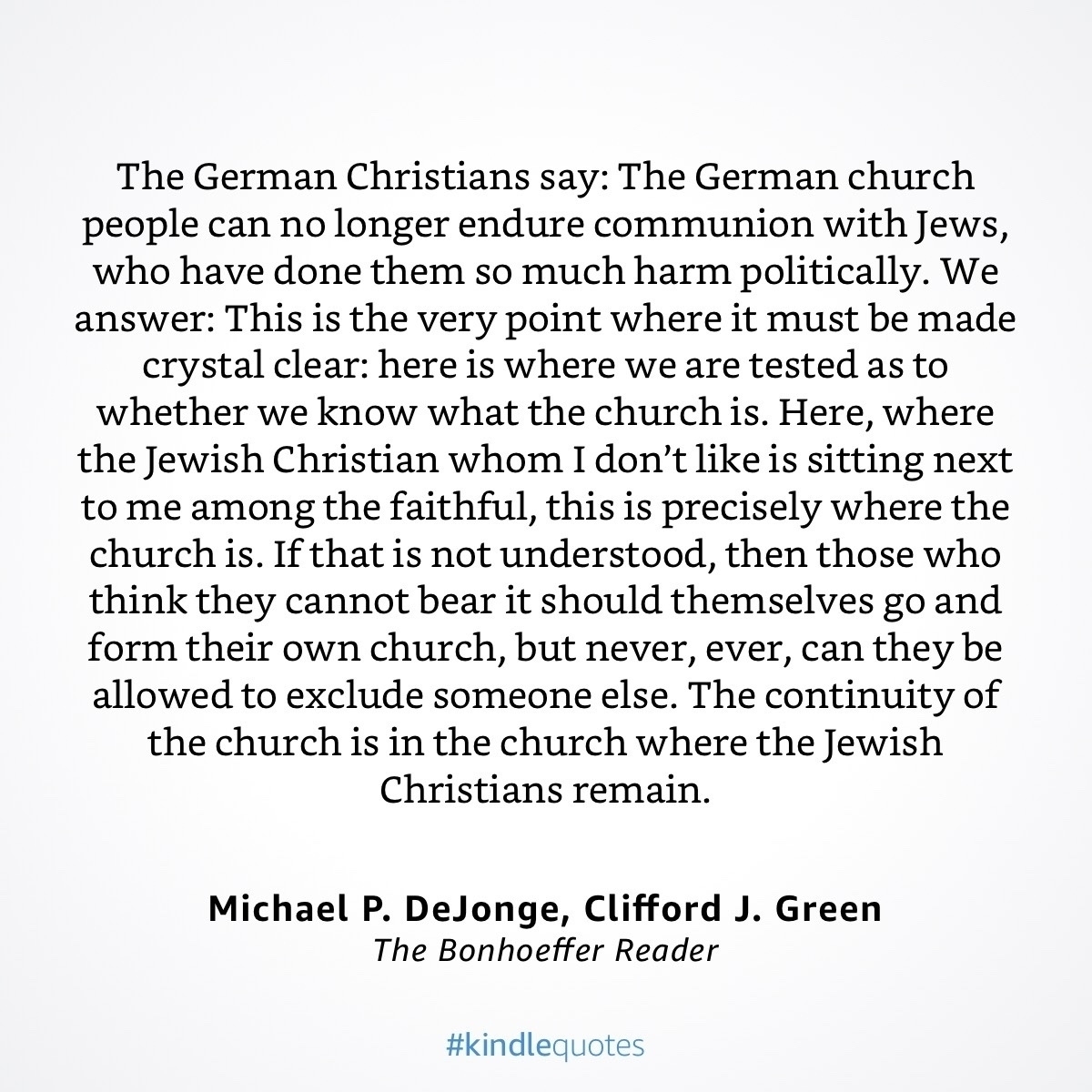
Another timely thought from Dietrich Bonhoeffer in response to the 1933 “Aryan Paragraph.”
Currently reading: The Bonhoeffer Reader by Michael P. DeJonge 📚
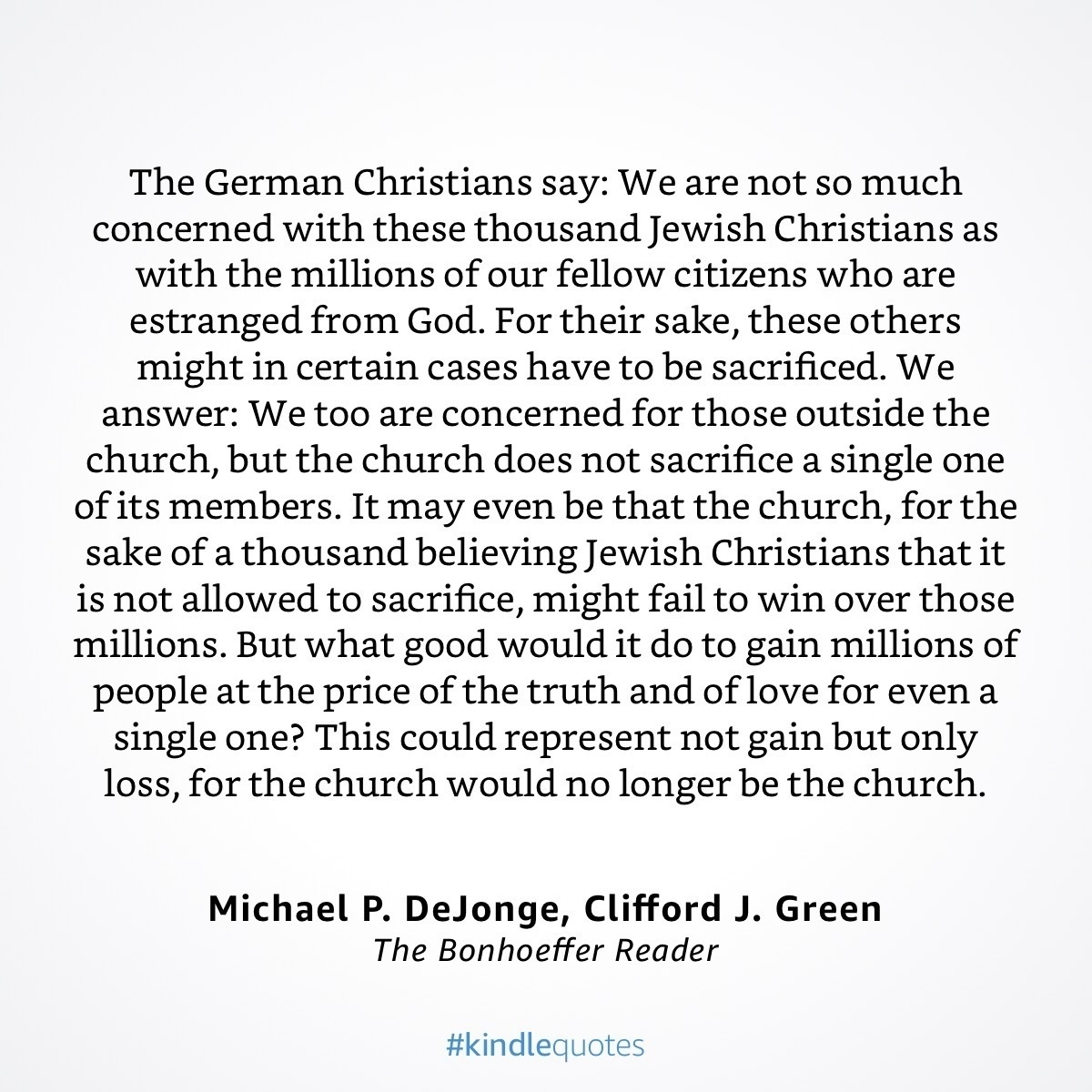
Here’s the second of the theses that Bonhoeffer penned to challenge the Aryan Paragraph in 1933. Again, it reads as very timely for our moment in history.
Currently reading: The Bonhoeffer Reader by Michael P. DeJonge 📚
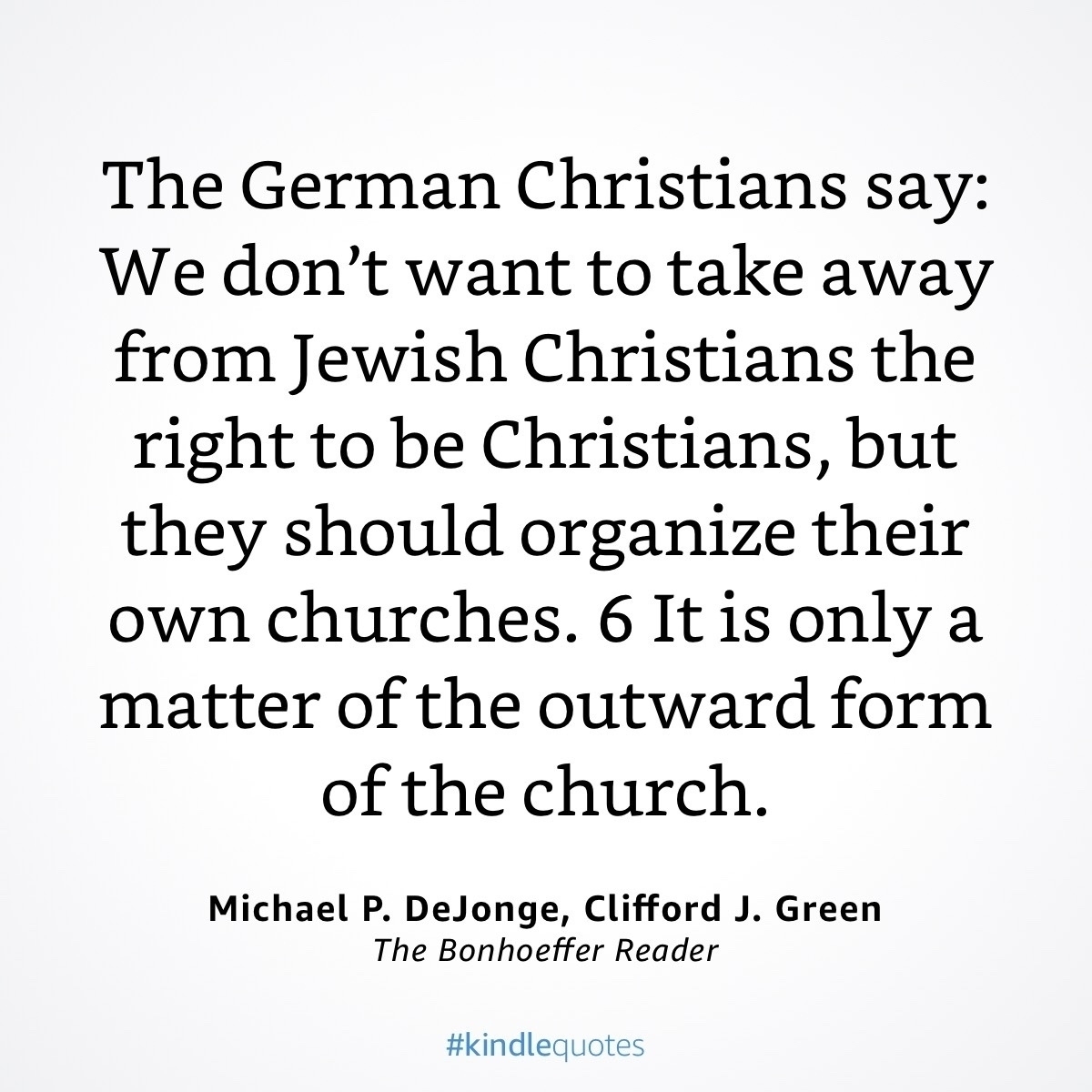
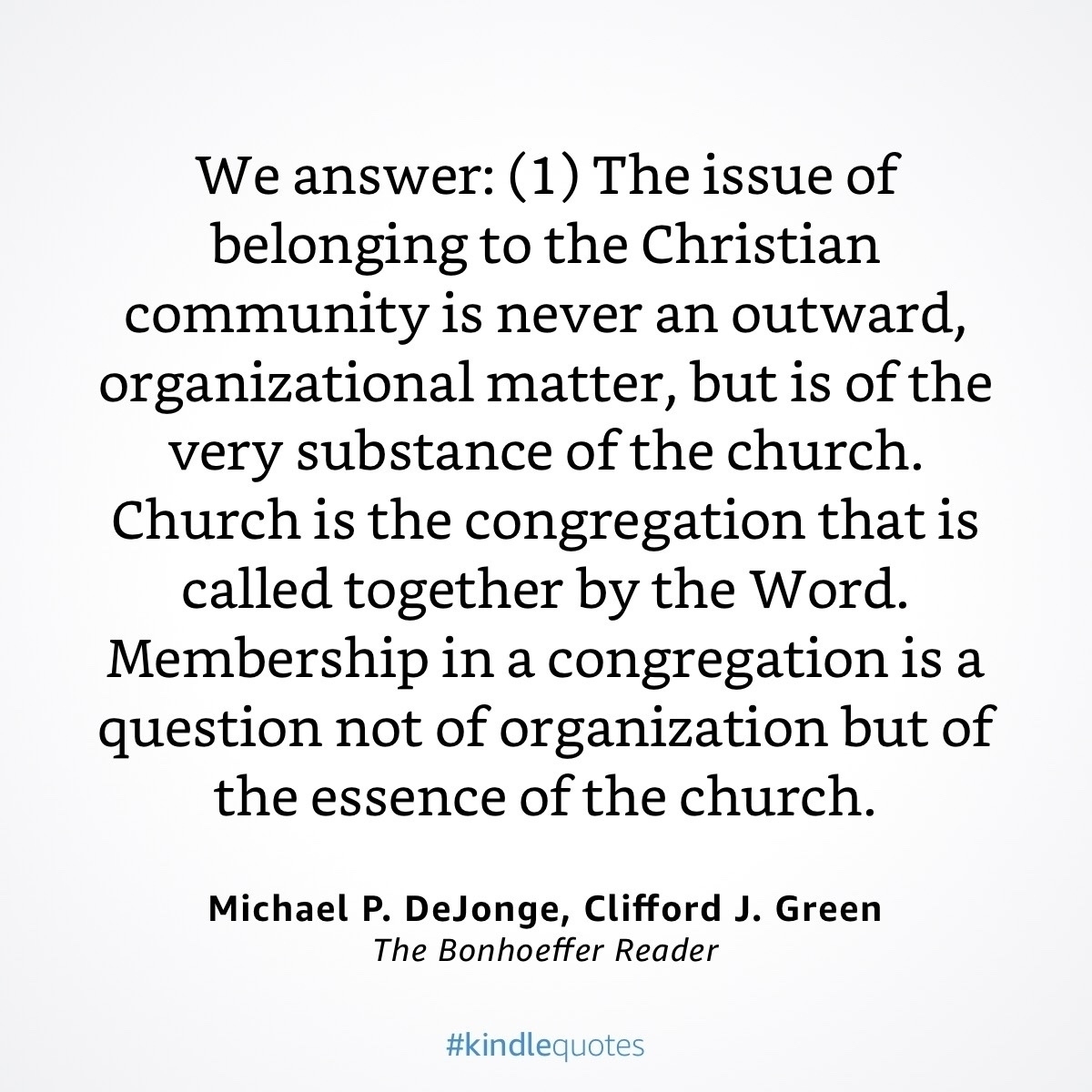
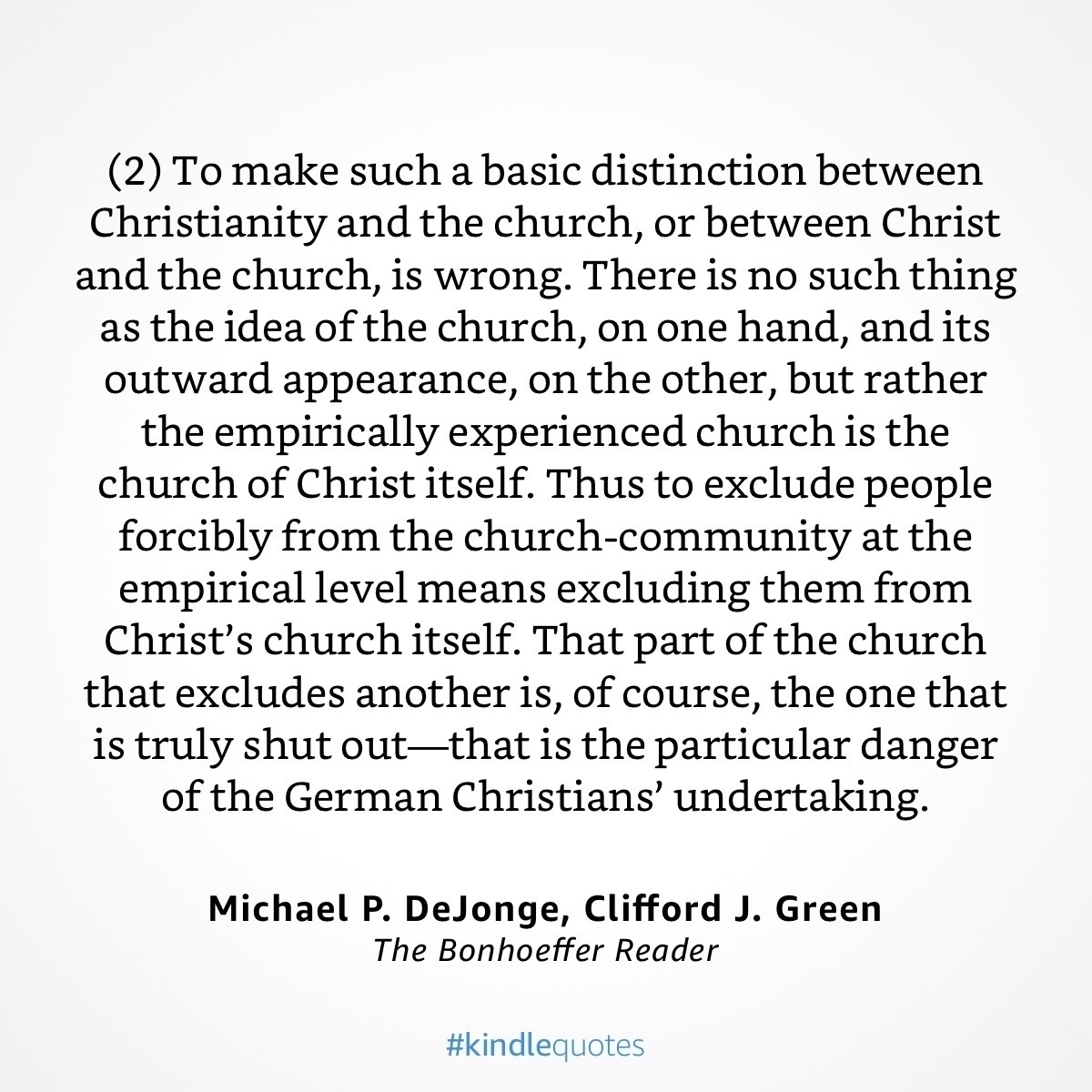
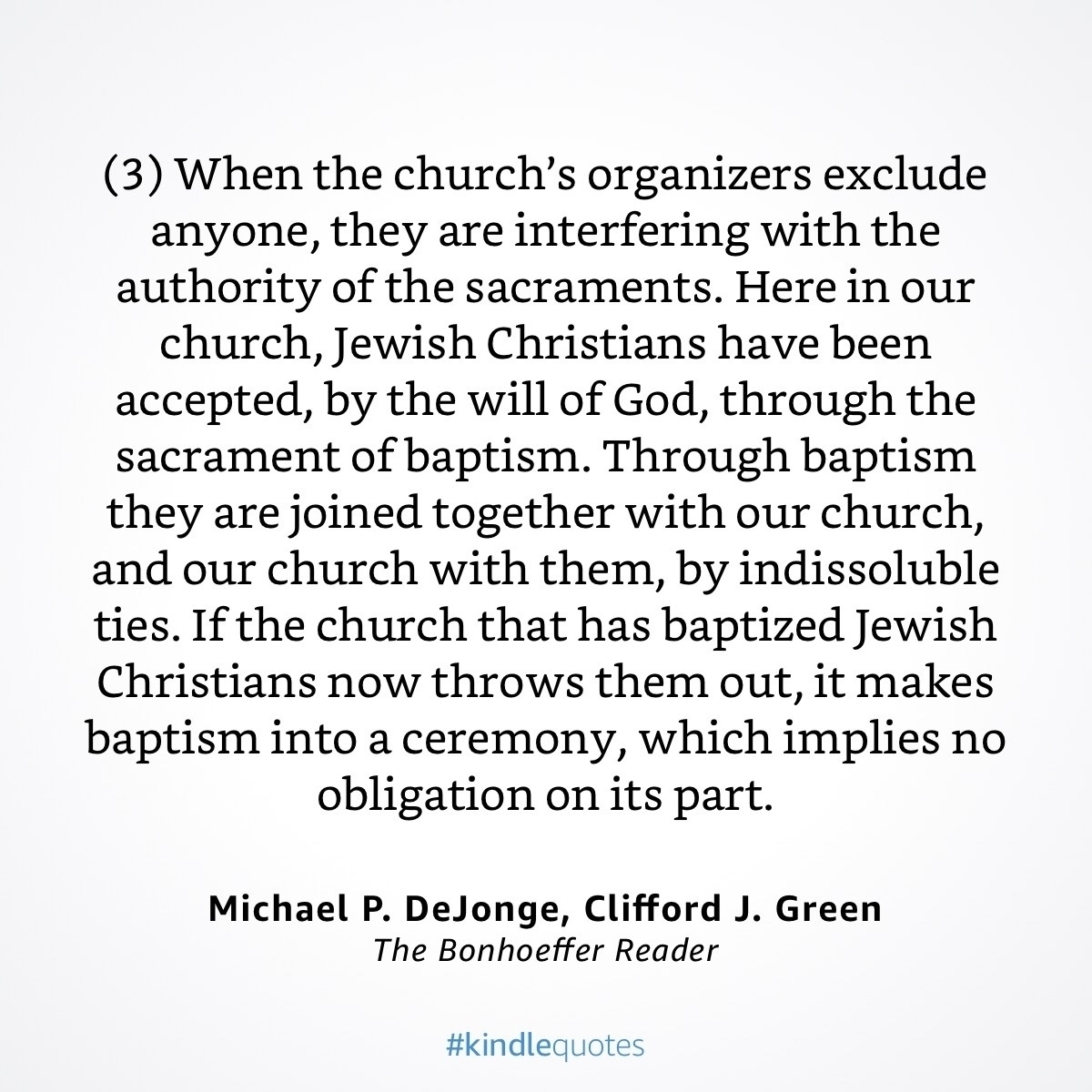
Dietrich Bonhoeffer composed a number of talking points to refute what was known as the “Aryan Paragraph” in September of 1933. The paragraph excluded non-Aryans from civil service which was beginning to be adopted by German churches.
Currently reading: The Bonhoeffer Reader by Michael P. DeJonge 📚
![The German Christians say: The church is not allowed to undo or to disregard God’s orders, and race is one of them, so the church must be racially constituted. We answer: The given order of race is misjudged just as little as that of gender, status in society, etc. . . . In the church, a Jew is still a Jew, a Gentile a Gentile, a man a man, a capitalist a capitalist, etc., etc. But God calls and gathers them all together into one people, the people of God, the church, and they all belong to it in the same way, one with another. The church is not a community of people who are all the same but precisely one of people foreign to one another who are called by God’s Word. The people of God is an order over and above all other orders. “Who is my mother, and who are my brothers? . . . whoever does the will of my Father in heaven is my brother and sister and mother” [Matt. 12:48, 50]. Race and blood are one order among those who enter into the church, but it must never become a criterion for belonging to the church; the only criterion is the Word of God and faith.
&10;
&10;DeJonge, Michael P.; Green, Clifford J.. The Bonhoeffer Reader (Function). Kindle Edition.](https://cdn.uploads.micro.blog/8609/2025/image-2-4-25-at-12.47pm.jpg)
This is such a timely read. Bonhoeffer’s writing is so highly applicable to our times.
Currently reading: The Bonhoeffer Reader by Michael P. DeJonge 📚
Unreal book deal right now…
NT Wright’s New Testament for Everyone complete 18 volume set is on sale for Kindle for $5.99!
John Goldingjay’s Old Testament for Everyone complete 17 volume set is on sale for Kindle for $5.99!
📚
From Bonhoeffer on the command to love our neighbor and enemy. This was from a talk he gave to a student organization at the end of 1932.
I am really bad at this. I need to grow.




I am still processing this quote from my reading last night. This is part of Bonhoeffer’s conclusion on a talk on the prayer, “Thy kingdom come.”
Too often the American Church has derided struggle as a sign of not keeping “in step with the Spirit.”
Yet, as we read the Scripture we see over and over again that struggle is central to inbreaking of the kingdom of God.

I’m really enjoying this book so far. I think it might make for a good preaching outline.
Currently reading: 15 New Testament Words of Life by Nijay K. Gupta 📚
Finished reading: Following Jesus by N. T. Wright 📚
I’m excited to share some quotes and notes from this little book. It is an excellent read!
"Yes, there was a whiff of triumph on Palm Sunday, but not the kind of triumph that might impress Rome and not the kind that impressed crowds in Jerusalem for long either. What manner of king was this?"
From: The Jesus I Never Knew by Philip Yancey 📚
This week, let us consider the different manner of king that Jesus was.
Jesus himself had mixed feelings during the clamorous parade. Luke reports that as he approached the city he began to weep. He knew how easily a mob could turn. Voices who shout “Hosanna!” one week can shriek “Crucify him!” the next.
From: The Jesus I Never Knew by Philip Yancey 📚
As we step into holy week this quote has been on my mind. Particularly, “how easily a mob could turn.”
Would I have turned?
Would I have shouted “Hosanna!” and then shrieked, “Crucify!”?
I know of no more poignant contrast between two human destinies than that of Peter and Judas. Both assumed leadership within the group of Jesus’ disciples. Both saw and heard wondrous things. Both went through the same dithery cycle of hope, fear, and disillusionment. As the stakes increased, both denied their Master.
From: The Jesus I Never Knew by Philip Yancey 📚
If this isn’t a “but by the grace of God go I,” I don’t know what is.
Jesus’ response to suffering people and to “nobodies” provides a glimpse into the heart of God. God is not the unmoved Absolute, but rather the Loving One who draws near.from: [The Jesus I Never Knew](https://micro.blog/books/9780310295815) by Philip Yancey 📚
This might be one of the most challenging concepts for many American Christians to wrap our minds around. We have been told for so long that God is non-emotional. Yet, in the person of Jesus, we see God draw near in love. This is the consistent response of Jesus in the Gospels to the people who are on the “outside.”
